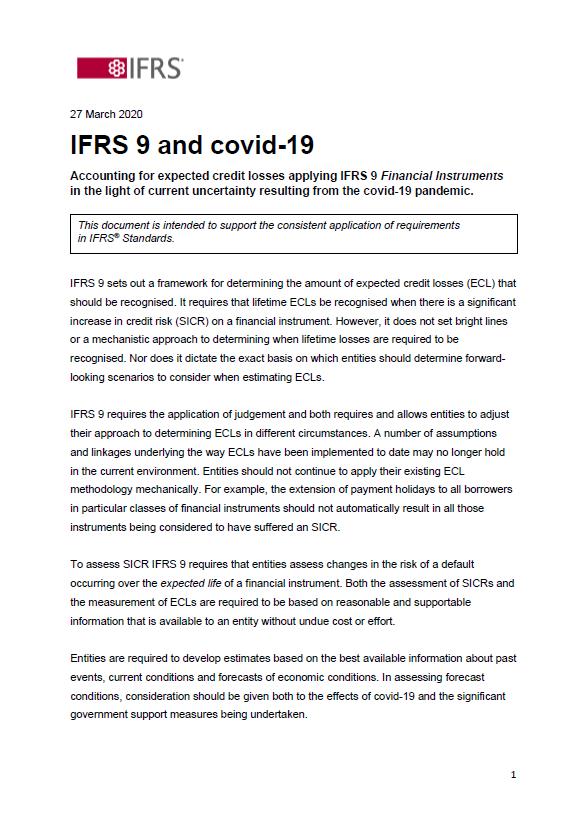This accounting alert is issued to highlight the requirements within IFRS 9, Financial Instruments, that are relevant for companies considering how the pandemic affects their accounting for expected credit losses (ECL).
Introduction
On March 27, 2020, the International Accounting Standards Board (IASB) published a document responding to questions regarding the application of IFRS 9 during this period of enhanced economic uncertainty arising from the COVID-19 pandemic. The document is intended to support the consistent and robust application of IFRS 9. Likewise, it does not change, remove nor add to, the requirements in IFRS 9.
The following are principles highlighted in the document:
1. Entities must use all reasonable and supportable information available.
The document acknowledges that estimating ECL on financial instruments is challenging in the current circumstances and highlights the importance of companies using all reasonable and supportable information available—historic, current and forward-looking to the extent possible—when determining whether lifetime losses should be recognized on loans and in measuring ECL. In assessing forecast conditions, consideration should be given to:
- the effects of COVID-19; and,
- the significant government support measures being undertaken.
It is likely to be difficult at this time to incorporate the specific effects of COVID-19 and government support measures on a reasonable and supportable basis. However, changes in economic conditions should be reflected in macroeconomic scenarios applied by entities and in their weightings. If the effects of COVID-19 cannot be reflected in models, post-model overlays or adjustments will need to be considered. The environment is subject to rapid change and updated facts and circumstances should continue to be monitored as new information becomes available.
2. IFRS 9 does not provide bright lines nor a mechanistic approach in accounting for ECL.
IFRS 9 requires the application of judgement and requires and allows entities to adjust their approach to determining ECL in different circumstances. A number of assumptions and linkages underlying the way ECL have been implemented to date may no longer hold in the current environment. Entities should not continue to apply their existing ECL methodology mechanically. For example, the extension of payment holidays to all borrowers in particular classes of financial instruments should not automatically result in all those instruments being considered to have suffered a significant increase in credit risk (SICR). To assess SICR, IFRS 9 requires that entities assess changes in the risk of a default occurring over the expected life of a financial instrument.
Although current circumstances are difficult and create high levels of uncertainty, if ECL estimates are based on reasonable and supportable information and IFRS 9 is not applied mechanistically, useful information can be provided about ECL. Indeed, in the current stressed environment, IFRS 9 and the associated disclosures can provide much needed transparency to users of financial statements.
See attached IASB document for the complete details of this publication.

